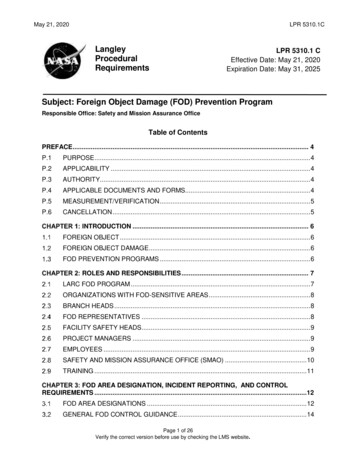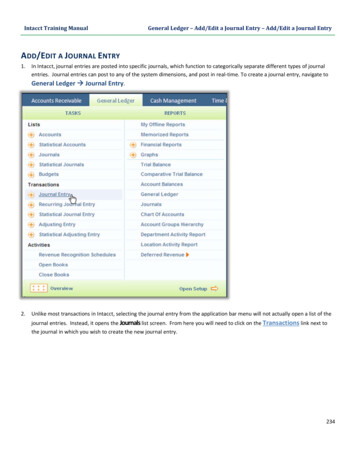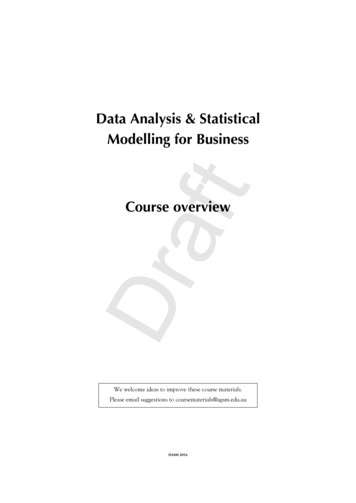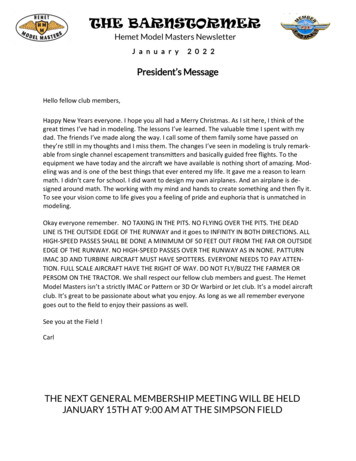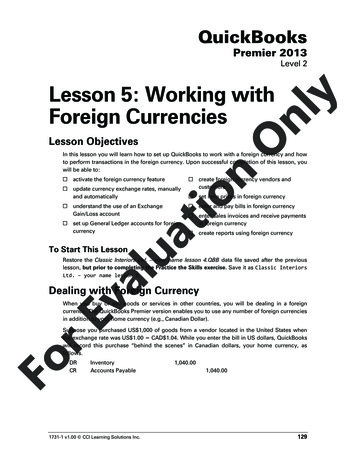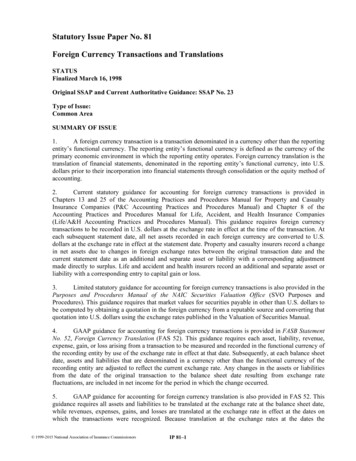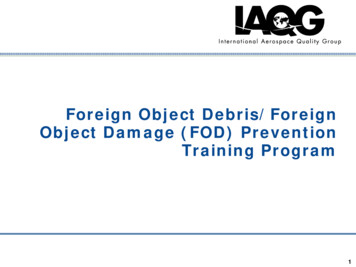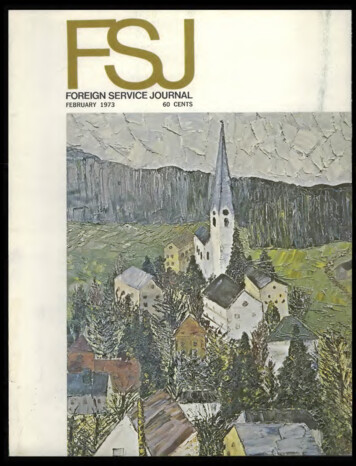
Transcription
F0REIGK1 SERVICE RRDUSIR OFFICERS SAVE GURIEVWITH II5RR mSURRnCE.USAA Insures Homes, HouseholdGoods, Automobiles, PersonalPossessions, Boats, your PersonalLiability, and your Life*. And forless money than most other com panies. Initial premiums are low.Dividends (not guaranteed, butpaid every year since 1924) makethe cost even lower.Most of USAA’s coverages followright along with policy holder-members whenthey go overseas. House hold Goods, PersonalArticles (for expensivecameras, furs, silver ware, jewelry, and similaritems), Personal Liabil ity, and Boatowners policies offerworldwide coverage. Auto insur ance is available in many foreigncountries. As a career Ambassadoror Minister, or commissioned offi cer in the Foreign Service or U.S.Information Agency, you are eligi ble to apply for insurance. Onceyou have a policy with USAA, youare always eligible to apply formore insurance at anytime, even if you leavethe Foreign Service. Usethe coupon to request in formation on USAA’spolicies.USAA-THROUGH A WHOLLY OWNEDSUBSIDIARY OF USAA.SEND INFORMATION FOR INSURANCE CHECKED BELOWKUSAAUSAA Building,San Antonio,Texas 78288UNITED SERVICES AUTOMOBILE ASSN.(A reciprocal interinsurance exchange) Automobile Household Goods and PersonalEffects —Worldwide (clothing, china,cameras, golf clubs, etc.) Comprehensive Personal Insurance(Liability) Renters Insurance(combination Household Goods andComprehensive Personal Insurance.) Personal Articles Floater(Expensive single items —jewelry,furs, art, etc.) (Available only to Career Ambassadors, CareerMinisters, and commissioned officers of the For eign Service and the United States informationAgency, including those who are retired.)3038PLEASE PRINT OR TYPE WITHIN SPACE BELOWFull Name Personal Rank and Class*Soc. Sec. No.Boatowners.(STATE)Homeowners or Dwelling Fire andAllied Perils(STATE)USAA LIFE INSURANCE CO.(A wholly-owned subsidiary of USAA) Life InsuranceDate of BirthDayMonthYear(Life ins. not available in Mass., N.J., Ohio)Street Address City State ZipCountryArea Code Phone Number USAA Membership No.(If Stateside) Not a USAA Member*R and S Classes not eligible unless holding aPresidential commission(There is no obligation)a
American Foreign Service AssociationDAVID H. McKILLOP, PresidentPRINCETON LYMAN, First Vice PresidentHORACE G. DAWSON, JR., Second Vice PresidentBoard of DirectorsFOREIGN SERVICE JOURNALWILLIAM C. HARROP, ChairmanTHOMAS D. BOYATT, Vice ChairmanBARBARA J. GOOD, Second Vice ChairmanDAVID W. LOVING, Secretary-TreasurerJOHN J. TUOHEY, Assistant Secretary-TreasurerHERMAN J. COHENJAMES L. HOLMES, JR.F. ALLEN HARRISWILLIAM R. LENDERKING, JR.LINDA LOWENSTEINW. A. WHITTENStaffFEBRUARY 1973: VOLUME 50, NO. 2GERALD BUSHNELL, Executive DirectorCLARKE SLADE, Educational ConsultantHELEN VOGEL, Committee CoordinatorC. B. SANNER, Membership and CirculationJournal Editorial BoardNeeded: A Second Generation ofSupranational Institutions 9LESTER R. BROWNTERESITA C. SCHAFFER, ChairmanRALPH S. SMITH, Vice ChairmanFREDERICK QUINNEDWARD M. COHENHARRIETT S. CROWLEYG. RICHARD MONSENJOEL M. WOLDMANJournalSHIRLEY R. NEWHALL, EditorMclVER ART & PUBLICATIONS, INC., Arf DirectionThe Decline and Fall ofAmerican Efficiency15EDMUND A. SCHECTERAdvertising RepresentativesJAMES C. SASMOR, 295 Madison Ave., New York, N.Y. 10017(212) 532-6230ALBERT D. SHONK CO., 681 Market St., San Francisco, Calif.94105 (415) 392-7144JOSHUA B. POWERS, LTD., 5 Winsley Street, London W.l 01580 6594/8. International Representatives.Open Letter to ConsularAppointees16CHARLES S. KENNEDY, JR. American Foreign Service Association, 1973. The ForeignService Journal is published twelve times a year by the Amer ican Foreign Service Association, 2101 E Street, N.W., Wash ington, D. C. 20037. Telephone (202) 338-4045Soldiering for State andSurviving 18RONALD D. PALMERSecond-class postage paid at Washington, D. C.OTHER FEATURES: Rosebuds ’Round Her Navel, by Jorma L. Kaukonen,page 4; American Wine, by Robert J. Misch, page 29.The FOREIGN SERVICE JOURNAL is the journal of professionals inforeign affairs, published twelve times a year by the American For eign Service Association, a non-profit organization.DEPARTMENTSLetters to the EditorThe BookshelfEditorialsAFSA News2203435Material appearing herein represents the opinions of the writers and isnot intended to indicate the official views of the Department of State,the United States Information Agency, the Agency for InternationalDevelopment or the United States Government as a whole.Membership in the American Foreign Service Association is open tothe professionals in foreign affairs overseas or in Washington, as wellas to persons having an active interest in, or close association with,foreign affairs.Membership dues are: Active Members—Dues range from 13 to 52annually depending upon income. Retired Active Members—Dues are 30 annually for members with incomes over 15,000; 15 annuallyfor less than 15,000. Associate Members—Dues are 20 annually.For subscription to the JOURNAL, one year (12 issues); 6.00; twoyears, 10.00. For subscriptions going abroad, except Canada, add 1.00 annually for overseas postage.Articles appearing in this journal are abstracted andHistorical Abstracts and/or America: History and Life.COVER: Oberrieden, Switzerland, by Eva MarshindexedinMicrofilm copies of current as well as of back issues of the FOREIGNSERVICE JOURNAL are available through the University Microfilm Li brary Services, Ann Arbor, Michigan 48106 under a contract signedOctober 30, 1967.
LETTERS TO Dissent and Heresy A number of inquiries as to ap propriate organizations to whichcontributions may be made in mem ory of John Carter Vincent havebeen received and it was decidedthat the American Civil LibertiesUnion in seeking to preserve anddefend the basic human rights ofindividuals at times of unrest andpopular reprisals is the most repre sentative of his ideas and philoso phies. He knew well the form suchreprisals can take, and their effecton the individual.My husband’s favorite philoso pher and theologian was Spinoza,who also went through great trialsand tribulations and who said, “Themisfortunes of history made dissentfrom the most palpable absurdities,capital heresy” and so it was withJohn Carter Vincent and the wholeChina service, in the 1940s.ELIZABETH THAYER VINCENTCambridgeA Congregation of GrievantsThis section was inadvertently omit ted from Ambassador Ellis O. Briggs’letter in the January JOURNAL. Your basic premise is furthernourished by the notion that StateDepartment “management,” unlesscurbed by the vigilance of thosearmed with the weapon of “exclu sive bargaining,” and with what youterm “impartial review” (by whichyou really mean a mechanism de signed to override a decision of theSecretary of State), will inevitablyresult in exploiting the workers—i.e. the personnel of the ForeignService.Wherefore you propose that mat ters henceforth be “co-determined”between the State Department onthe one side, and AFSA, as the pro tector of the workers, on the other.In the circumstances of profes sional diplomacy, that philosophy,as outlined in the printed “AFSAPlatform,” is nonsense.Worse, it is nonsense of a dan gerous and pernicious character.If adopted, it would hamper theability of the Secretary of State toperform his functions. It would en 2FOREIGN SERVICE JOURNAL,mesh his subordinates handling per sonnel. It would impair if not even tually destroy the morale of theForeign Service.The recent publicity and one sided propaganda emanating fromAFSA has already adversely affectedthat morale by focusing the atten tion of Foreign Service personnelon their privileges, grievances andsecurity, at the expense of theirresponsibilities, opportunities andobligations.As I observed upon first readingExecutive Order 11636 (whichnever should be applied to theofficers of the Foreign Service, whoare not “employees” but men andwomen commissioned by the Presi dent of the United States, by andwith the consent of the Senate),one searches through those drearyparagraphs for such phrases as“pride of accomplishment,” “patri otic performance,” “willingness onbehalf of the country to face hard ship and peril”—or in one word,“service”—but he who reads thatExecutive Order searches for thosewords in vain.Instead, for all the obeisances toprofessionalism and merit, I findAFSA, under that Executive Order,promoting a Congregation of Griev ants, whose greatest triumph will notbe in meeting the challenges yousalute, but in spitting in the eye ofManagement—and getting away withit. How, moreover, does your solici tude for “grievants” jibe with yourstatement that only a “minute pro portion” of Foreign Service person nel believe they have been unfairlytreated? To gratify that “minute pro portion,” is it necessary to erect thatelaborate array of boards and panelsand commissions and committees,dedicated, if I correctly read theportents, to the survival of the unfittest?Lastly, in your preoccupation withanti-elitism and your pursuit of egali tarian drabness, you would makeof elite an ugly word, a term of op probrium. Who questions that themechanic in the motor pool, the ac countant who balances the books,the courier who carries the diplo matic pouches, and the Ambassadorwho deals with the Foreign Minister,are not all American citizens work February, 1973ing abroad for the United StatesGovernment. Agreed—but they arenot all diplomats, and you are naiveif you assume that shared nationalityequals a line drawn for the benefitof non-diplomats through the lowestcommon denominator of achieve ment.A Modest Proposalstill the same old problem.Even after ex-President Hoover,Secretary Herter, Dr. Wriston and ahost of others, most lately Bill Macomber, have had their way withreformation and reorganization, ev erybody still seems to go on hatingthe State Department. Bob Shorthas taken the Senators to Texas,and now State has moved up to theposition of number one Washingtonwhipping boy.The blunt truth is that the For eign Service itself is obsolete. In anera of jet planes and hot lines, weare still relying on the old ForeignService, disciplined in the arts ofdiplomacy and protocol. Even theso-called “new diplomacy” is merelythe logical extension of the old di plomacy to the new responsibilitiesof the United States as a worldpower in the second half of thetwentieth century; it has nothing todo with the age of technetronics.The State Department’s top echelonmay know what is wrong with theStanley Steamer on today’s su perhighways, but somehow theyhaven’t yet grasped the fact thatthey too are using the wrong kind ofpower. They are still on the wrongtrack, no pun intended. I supposean ecologist would say that eutroph ication has reached irreversible lim its in Foggy Bottom. Anyway, theForeign Service has become as ex tinct as the passenger pigeon andjust about as useful. Retool or re direct the Service all you like, it cannever again be a substitute for AirForce One.Somehow the worst is over whenthis hard fact is faced. After all, inan era when every American touristis officially labeled an Ambassadorof Good Will, there must be someplace for career ambassadors. Notto mention first, second, and thirdsecretaries. If an army can becomea “peace-keeping force,” if a cob bler’s bench can be turned into a(Continued on page 35)I T’S
The fine art of summitry has seldom beenpracticed with such authority as by the 1973Lincoln Continental and the Ford LTD.Each is a leader in its own realm. TheLincoln Continental . . . the final step uparound the world. The Ford LTD . . .a better idea in luxury and quiet.Both are available at exceptional savingswhen you exercise your diplomatic discountprivileges as a member of the U.S. ForeignService. Order now. Save now. Arrangedelivery stateside or overseas.For full information:In the Washington area, contactDiplomatic Sales, Ford Motor Company, 9thFloor, 815 Connecticut Avenue, N.W.,Washington, D.C. 20006. Telephone:298-7419.In the New York area, contact DiplomaticSales, Ford Export Corporation, Ford MotorCompany, 153 Halsey Street, Newark, N.J.07102. Telephone: 643-1900. From NewYork, telephone: 964-7883.1973 Ford LTD BroughamFORD TORINO THUNDERBIRD MUSTANG MAVERICK PINTO MERCURY MARQUIS MONTEREY MONTEGO COUGAR COMET LINCOLN CONTINENTAL CONTINENTAL MARK IVAll 1973 cars must meet Federal Emission Standards before sale. See your Ford Dealer for details.
A RETIREMENT CHRONICLE by JORMA L. KAUKONENiL AST spring, when I was in Washington briefly, Icalled on Margaret Turkel—an old and dear friend—and she was intrigued by how I spent some of the hoursof my retirement. I am by nature a dignified, polysyllabic,somewhat pompous man and she thought it amusingthat I should have become involved peripherally in theworld of rock music. It was her idea, I guess, that theremight be something inspirational in my story for otherForeign Service officers, suddenly thrust into a nonnine-to-five environment, out of reach of a major, metroJorma L. Kaukonen’s government service began in 1935 andended in 1970. He worked for the Social Security Board, thePublic Health Service, the Federal Agency and the War Man power Commission. WWI1 took him to Japan as a censorshipofficer, to Korea as a labor advisor, to Pakistan as representa tive of the Asia Foundation and to the Department of Labor asa Far Eastern area specialist. In 1957 he joined the ForeignService as Labor Attache and First Secretary in Manila, trans ferring to Stockholm in 1962 and to Ottawa in 1967.politan newspaper, no daily morning staff meetings toattend, and nothing to do except prune the roses.Let me begin with a factual statement of some of thefringe benefits of my new life. I was at a concert recentlyhere in San Francisco at the Winterland where theJefferson Airplane, in a manner of speaking, was makinga triumphant return to its birthplace. The Airplane hadnot concertized for quite a while in its native city and thiswas a major cultural event in any man’s book. I wasbackstage in the dressing room, listening to my sonJorma, the guitarist, and Jack Casady, the bassist, warmup. Later they would be joined in this backstage mini concert by other members of the group, but at themoment I was listening to a great piece of stringedvirtuosity in an ambiance which was peculiarly SanFranciscan—permissive, free and easy.The dressing room was pretty crowded, except for thecorner where young Kaukonen and Casady were warm ing up, and people garbed in the non-Brooks Brothers,Worldwide Ill-Risk Insurance CoverageFor Government EmployeesSpecial rates for American Foreign Service Association membersThe annual Government Service Policy wasdesigned more than 40 years ago especially to meet thepersonal property insurance needs of all employees ofthe United States Government. It covers all householdand personal effects — including, as declared, furs,jewelry, silverware, paintings, antiques, cameras, liquor—against fire, theft, mysterious disappearance, wind storms, floods, breakage and general average—at anylocation in the world including accompanying luggage.The premium is the same throughout the world.Yearly premium computed as follows: first 1,000, 2%;next 4,000, V/z%\ and 1% for any value thereover.Thus, for 10,000 valuation, you pay only 130 yearly.Lower rates available to AFSA members.The policy may be extended to cover goods intransit—premium charge dependent upon origin anddestination—always one-half or more off the normaltransit rate.AUTOMOBILE TRANSIT COVERAGE: Security also writes an all-risk automobile transit policywith a 50.00 deductible to any destination in the world. Contact us for rates.For more information,jSwuritft jStorajf ompangwithout obligation, callor write today .1701 Florida Avenue, N.W.4FOREIGN SERVICE JOURNAL,February. 1973 „ttf OJaShmgtOnWashington, D. C. 20009CED' P E N TTel. 1202) 234-5600Cable: STORAGE
YOU4CAN’T HIDEFROMACCIDENTS!.hutYOU CAN PURCHASE UP TD 200,OOO.ooin ACCIDENTAL DEATHandSPECIFIC LOSS INSURANCEDesigned with the needs of AFSA members in mind,this unique program covers accidental death, dis memberment, or loss of sight.YOU SAVE MONEY, TOO! Because of your member ship in the AFSA, (American Foreign Service Association) this remarkable plan is available to youat a cost below what you would expect to pay fora similar coverage purchased on an individual basis.Complete and return the coupon for full details onthis vital coverage.REMEMBER .YOU CANT HIDE FROM ACCIDENTS, RUT YOU CAN PROTECTYOURSECF FROM THE FINANCIAE DISASTER THAT OFTENACCOMPANIES THEM!AMERICAN FOREIGN SERVICE ASSOCIATIONJoseph E. Jones, Agency1666 Connecticut Avenue, N.W.Washington, D. C. 20009Please rush me full details on AMERICAN FOREIGN SERVICE ASSOCIATION DisabilityIncome Plan.Tht Company that paysCityFOREIGN SERVICE JOURNAL,February, 19735
Peter, Jorma, Sr., and Jorma, Jr. in Jorma, Jr.’s living room.“The big eye behind us is friendly."non Neiman-Marcus costumes of the day wandered backand forth. Shades of Hogarth and Custer and the PlainsIndians and the Cavaliers and the Forty Niners and the25th century! As I sat there bemused, a bare midriffappeared in front of my eyes and was stationary for amoment. It belonged to a “chick,” if I may be permittedthe vernacular, in the first full flush of her nubility. Shehad a wreath of rosebuds tattooed around her navel andI knew from the colors that this was the work of LyleTuttle who is responsible for a veritable renaissance ofthis ancient art in the Bay area.This was a fringe benefit indeed. I never would haveseen it, had I not been impelled to become a rock musicaficionado and to write from time to time—not so muchabout the Airplane as about the music of Hot Tuna andBlack Kangaroo. I ought to conclude this sidelight bysaying that the concert that evening was great, theAirplane invigorated by the guest reappearance of MartyBalin whose duets with Grace Slick were highlights of thelate ’60s. Lights flashed, people danced, and the musicwas evocative—some of it—of that simpler time of whichWoodstock was the symbol.But I think I like the music of Hot Tuna even morethan that of the Airplane at this moment. Hot Tuna hassome of the same personnel as the Jefferson Airplane—lead guitarist Jorma Kaukonen, bassist Jack Casady, andviolinist Papa John Creach. It has an immediacy, anintensity, a compelling palpable power which movespeople physically as well as intellectually and it is HotTuna which has propelled me into my retirement voca tion as campfollower and writer about rock and as a parttime sound archivist. The first thing I wrote about HotTuna was what has been described as their officialbiography. This was followed by an article on the art in apopular rock magazine and I was gratified recently to bestopped by a young man in Constitution Hall who had anarticle of mine in hand and who said he had liked it.Anyway, Hot Tuna is something—a passionate en6FOREIGN SERVICE JOURNAL.February. 1973
ANNOUNCESCONTINUED ADDED COVERAGE FOR MEMBERSAND THEIR DEPENDENTS WITHOUT ADDITIONAL COST.For this insurance year, March 1972 to March 1973,a basic 17,500 life insurance policywill pay 26,250and includes . 17,500 ACCIDENTAL DEATH ANDDISMEMBERMENTTHE COST: 100 per year to age 41; 125, 41 to 51; and 150, 51 thru 64 or to retire ment, whichever is later (or up to age 65).Also, for active members only if desired, 10,000 Additional Group Life plus 10,000Additional AD&D at an additional premium of 85 per year.HIGHER DEPENDENT LIFE BENEFITS-UP 50%SpouseUnmarried dependent:2 wks. & less than 6 mos.6 mos. & less than 2 yrs.2 yrs. & less than 3 yrs.3 yrs. & less than 4 yrs.4 yrs. & less than 5 yrs.5 yrs. to age 19 to age 21 3,0003006001,2001,8002,4003,000if full-time studentYOU ARE ELIGIBLE IF YOU ARE:ACTIVE FOREIGN SERVICE OFFICERFOREIGN SERVICE INFORMATION OFFICERFOREIGN SERVICE RESERVE OFFICERFOREIGN SERVICE STAFF OFFICER OF DEPARTMENT OF STATE, USIA and AIDunder 60(No Other Membership Requirements)For full details write:The American Foreign Service Protective Associationc/o Department of State, Washington, D. C. 20520or 1750 Pennsylvania Avenue, NW, Suite 1305, Washington, D.C. 20006Telephone: 298-7570
All risksinsurance 1.50 per 100 per annumWORLDWIDE(including USAINO DEDUCTIBLEUnderwritten atLloydsFor very many years U.S.O.I.B. Ltd. have insuredmembers of the Foreign Service. First class serviceand claims settlements.Complete and return coupon for full details.To: United Services Officers'! nsurance Brokers Ltd.Clanville Lodge, Andover, Hampshire, England.Please airmail details of your special policy forserving members of the Foreign Service.NameAddress8FOREIGNSERVICE JOURNAL,February. 1973gine, perhaps. I have heard it develop from its earliestdays when it opened the bill at Fillmore East for theAirplane, with Kaukonen Jr. and Casady shifting easilyfrom one identity to the other, assisted by Jorma’sbrother Peter.But it isn't just the Airplane and Hot Tuna whichinterest me. There is a group called Black Kangaroowhich culminates a development that began with Petrus,a band of great musicality which had a reputation in theearly days of the San Francisco musical renaissance andwhich led to Lizard, a trio utilizing an acoustic basswhich attracted a considerable following in Bay areaclubs. Black Kangaroo is the name of Peter Kaukonen’sband and of his recently released record. With taperecorder in hand, I have heard and recorded much ofPeter’s musical development during the past severalyears. He has responded to his own musical imperativewhich took him out of Hot Tuna at an early stage of thatgroup’s development to begin a journey which has takenhim a long way toward his goal as an artist recognized inhis own right.Recently, Black Kangaroo and Hot Tuna appeared onthe same bill in New York at the Academy of Music.Incredible. It made me think of the year in Stockholmwhen Peter was studying at Stockholm University andplaying and singing American blues to the prescientSwedish audiences in such places as the Domino andGrona Lund, to mention but two. Now in 1972, he hashis own band and is on tour to play on the same bills asHot Tuna, The Byrds, Alice Cooper, and Albert King,among others, with a brief excursion to play for thestudents of Hotchkiss in Lakeville, Connecticut where heprepared himself for Stanford and the nine to five careerForeign Service officers try to inflict on their children.Well, they’re both free of that and I occasionally askmyself what I did that was right when they were growingup. Nothing, I guess, except throw every obstacle I couldthink of in their way. But I doubt that was the spureither. I think they are lucky to be doing what they wantand to be doing it well.As for me, I’ve gotten a number of insights I wouldn’totherwise have had, over and above the nubile navelsurrounded by Lyle Tuttle’s artistry. Like for instance,Mick Jagger needs a new choreographer and his musicdoesn’t say anything new to me, although the RollingStones are very slick and professional and watching theiraudience is like watching sea plants responding to theforces of wind and wave. Or that the Who live is amusical experience not to be missed. Or that I like J. J.Cale and Osibisa and John Hammond who appearsfrequently with Hot Tuna and whose blues are almostbeyond compare. And that I don’t have to have the NewYork TIMES, the Manila CHRONICLE, DAGENS NYHETER,or the GLOBE AND MAIL first thing in the morning andthat since nothing changes in what used to be my realworld, I can make do with that occasionally charmingprovincial paper the San Francisco CHRONICLE. And,finally, in the world of the performing arts, even for thebystander, there is no nine to five syndrome and I amglad of that.
H Second GenerationofSupranational InstitutionsLESTER R. BROWNworld is so interdependentand so interwoven today thateconomic, political or scientific deci sions taken within one country mayaffect far more people outside thatcountry than within. Decisions by amultinationalcorporationmayaffect the well-being of the peoplein a given country more than thosetaken by the government of thatcountry itself. In many cases, thosewho are adversely affected have nopolitical recourse to those responsi ble for their plight.Decisions by a US CongressionalCommittee allocating sugar importquotas may have a greater impacton the well-being of rural laborersin northeastern Brazil than almostanything the Brazilian Governmentitself can do. Permission by theGovernment of Afghanistan to itshard-pressed farmers to produceopium for sale to illicit drug han dlers could negate efforts to arrestthe spread of drug addiction in theLester R. Brown is a Senior Fellow withthe Overseas Development Council. Hewas formerly Administrator of the Inter national Agricultural Development Serv ice and served as policy adviser to theSecretary of Agriculture on world foodneeds and agricultural developmentabroad. Recognized as a leading au thority on the world food problem whilestill in his 20s, Mr. Brown was selected bythe Jaycees as one of the “Ten Outstand ing Young Men of America” in 1966.United States. An African govern ment’s expropriation of the holdingsof a US mining company can affectthe retirement income of an elderlycouple in Minneapolis. A decisionby the United States Government inAugust of 1971 to devalue the dol lar relative to other major curren cies caused a precipitous drop in thevalue of common stocks on theTokyo stock exchange, a drop thatthe Japanese Government was pow erless to prevent.Economic actions have socialconsequences extending far beyondnational borders. So, too, do ecolog ical forces. Deforestation in Nepalincreases the severity of flooding inthe Indus and Gangetic Plains inIndia and Pakistan. The dischargeof waste mercury by Japanese andTaiwanese industrialists can causeswordfish to be taken off menus inthe United States. Oil spills fromNorwegian tankers affect beaches inFlorida. The discharge of industrialsmokestacks in the Ruhr and GreatBritain blackens snowfall in Scan dinavia, chemically contaminatingrivers and streams.We live in an age when problemsare increasingly world-wide—theworld monetary crisis, threat ofworld inflation, world environmen tal crisis, world drug problem, worldpopulation problem, the world foodproblem, and so forth. Few, if any,FOREIGNof mankind’s more pressing prob lems have purely national solutions.They can be solved only throughmultinational or global cooperation.While the more perplexing prob lems man faces today are global inscope, the institutions to cope withthem are largely national. Newtechnologies are creating problemsbut not the institutions capable ofsolving them.The political complexities andobstacles involved in creating ef fective supranational institutionsshould not obscure the fact thatmany existing international agencieshave already served mankind well.One need only think of such agen cies as the World Health Organiza tion or such bodies as the Interna tional Monetary Fund, which hasthus far weathered many crises enroute to creating an internationalmonetary system.In the environmental field, theUN conference held at Stockholm inJune 1972, has made a good begin ning toward creating a global infra structure to cope with problems ofthe environment. The StockholmConference provided a unique forumin which both developed and de veloping countries took the initialpolitical decisions that will helpthem to act together in a mannerconsistent with the earth’s physicallimits and interdependencies. With9SERVICE JOURNAL, February. 1B73
some 90 percent of the earth’s peo ple represented, important newprinciples were adopted to serve asguidelines for future national per formance. Despite strongly heldconvictions about national sover eignty, the nations agreed that theyhave a mutual responsibility forcommon property such as the atmos phere and the oceans. The un precedented Declaration on the Hu man Environment also stresses theresponsibility of nations not to in flict environmental damage on eachother, and calls for the conservationof finite resources, from minerals toplant species.The Stockholm delegates pro duced a 109-point program of inter national actions, and recommendedthe establishment of a permanentvehicle within the United Nations tocoordinate these actions, as well asa voluntary environmental fund tofinance it. The United Nations envi ronmental unit will have a broadmandate which stretches from moni toring the earth’s atmosphere, landand oceans, to providing environ mental education to the peoples ofthe developed and developingworlds. The proposed machinery isenvisaged both as a source of assist RECENT efforts to establish an in ternational oceanic authority providea specific example of the kind ofproblems, and the difficulties in volved in resolving them, that ur gently call for international agree ment and cooperation. The need forsuch authority is a consequence ofnew technologies that permit theexploitation of energy, mineral andfish resources in the world’s oceans;of the fierce competition for theseresources as evidenced by disputesover fishing rights off the West coastof Latin America, and of the con flicting claims of jurisdiction overnewly discovered underwater re serves of oil in the South China seaby Mainland China, Taiwan, Japanand South Korea.In order to avoid potentially dan gerous conflicts over exploitation ofoceanic resources, Malta’s ambassa dor to the UN, Arvid Pardo, pro posed in 1967 that an internationaloceanic regime be established afterappropriate study under the aegis ofthe UN “to ensure that nationalactivities undertaken in the deepseas and on the ocean floor willconform to the principles and provi sions incorporated in the proposedtreaty [the treaty creating the newEffective environmental instituations cannot be expected to flourishin a weak UN system. New supranational institutions are needed tocope with numerous problems now emerging.ance to governments i
more insurance at any time, even if you leave the Foreign Service. Use the coupon to request in formation on USAA's policies. -THROUGH A WHOLLY OWNED USAA SUBSIDIARY OF USAA. SEND INFORMATION FOR INSURANCE CHECKED BELOW K USAA UNITED SERVICES AUTOMOBILE ASSN. (A reciprocal interinsurance exchange) Automobile Household Goods and Personal




